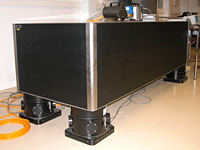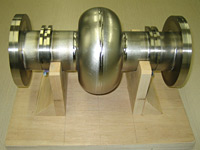 |
|
|
 |
France Gets Support to Join the ATF2 Collaboration

The 731-kilogramme stabilisation table at Annecy, with its active feet. |
At the ILC, the beam size is aimed to be unprecedentedly small – about only 6 nanometres in the vertical plane. The project requires important R&D. The ATF2 international project at KEK (See also 8 June 2006 issue of NewsLine) will help demonstrate the feasibility of this goal. It will provide an almost exact scaled-down copy of the final focusing system planned at the ILC. In France, a team of ILC scientists is supported by the new French-Japanese International Associated laboratory and has also just obtained funds from the newly created French research funding agency ANR (National Agency for Research) to join the ATF2 collaboration.
Three IN2P3 French laboratories, LAPP at Annecy, LAL at Orsay and LLR at Palaiseau will contribute to beam stabilisation at the final focus, development of optical corrections and optimisation of background simulation tools, in direct partnership with teams working on these issues at KEK. The starting French contribution was recently reviewed during a dedicated ATF2 workshop, which took place in Annecy, France, on 10-12 November 2006. Attended by 20 participants from Japan, France, CERN, Spain, UK and the US, this meeting was a rare occasion to discuss several of the key issues in detail.
Read more...
-- Perrine Royole-Degieux |
 |
|
|
 |
|
 |
The First SRF Cavity Developed in Korea

The first Korean 1.5 GHz SRF cavity for ILC R&D. |
In the end of 2004, the Pohang Accelerator Laboratory, a synchrotron light source facility in Korea, organised an ILC Task Force Team. Ever since, the members have been working in various fields of the ILC project, searching for suitable contributions as a small scale laboratory. The team's main linac group especially made some efforts to study superconducting cavity related technologies in collaboration with with K. Saito's group at KEK. Finally, by applying the knowledge acquired through ILC related research, PAL developed the first Korean 1.5 GHz SRF cavity.
Read more...
-- PAL ILC Task Force Team
(Won Namkung, Jinhyuk Choi, Younguk Sohn, Jung Yun Huang, Jongsuk Oh, Sungju Park) |
 |
|
|
 |
From Interactions.org
16 November 2006
Science Grid This Week Goes International
Today the worldwide science grid community launched International Science Grid This Week, a weekly publication reporting news and information about grid computing projects and collaborations, and the scientific research that uses grid computing technology.
Read more... |
|
From Interactions.org
14 November 2006
Universities appoint Inaugural Director of the Cockcroft Institute
The Universities of Manchester, Lancaster and Liverpool have appointed Swapan Chattopadhyay to the Sir John Cockcroft Chair of Physics.
Read more... |
|
From Chicago Tribune
11 November 2006
The 18-mile road to the future
The Chicago area is home to two of the greatest research laboratories in the world--Fermi National Accelerator Laboratory in Batavia and Argonne National Laboratory near Lemont. They are separated by less than 18 miles, but now will be linked for the first time by a common parent--the University of Chicago.
Read more... |
|
From symmetry Magazine
October/November 2006
The European Strategy for Particle Physics
The CERN Council Strategy Group has presented its recommendations in particle physics, focusing on a policy for Europe to "maintain and strengthen its central position" in the field.
Read more... |
|
From PR Web
15 November 2006
New Science Fiction Novel by a Scientist
Web publishing company Speculative Fiction Review announces the release
of "Proteus Rising," a mainstream science fiction novel that explores
the "what-ifs" of the
new genetic and computer modeling sciences in a suspenseful chase across
a Martian colony during an ethnic insurrection.
Read more... |
|
|
 |
 |
|
|
 |
The Evolving ILC Design: Lowering Detectors from the Surface
On 2 November, right before the very successful GDE meeting that has just concluded in Valencia, Spain, we officially made another important change to the ILC baseline design. Instead of assembling the detectors in their final resting place, they will be assembled on the earth's surface and carefully lowered

"Don't go burying yourself alive or getting yourself caught so you will hang there like a bottle that has been dropped down to cool" says Sancho Ponza to Don Quixote as he is about to be lowered into the cave. |
down to the caverns a hundred meters or so below ground. Although the CMS experiment for the LHC lends credibility to such a scheme, I like to imagine that some inspiration came from Don Quixote and his adventure of the Cave of Montesinos in the heart of La Mancha, Spain. Of course, I am influenced by being in Spain at the moment, and also because I happen to be reading the great novel of Miguel de Cervantes. Nevertheless, I am not the first to make connections between this particular adventure and cosmology and the universe. In some sense, the story parallels our new plan to carefully drop down our large complex and delicate experimental instruments, in order for us to explore the unknown wonders of the universe.
Read more...
-- Barry Barish
Director's Corner Archive |
 |
|
|
 |
|
ILC Detector Test Beam Workshop
Registration is now open for the ILC Detector Test Beam Workshop that will take place at Fermilab 17-19 January 2007. The workshop will assess the current and future needs for test beams for the ILC detector R&D program, and provide input to facility managers and users, and to the World-Wide Study group for the development of a road map. You can learn more and register here.
ILC-Related Preprints
hep-ph/0611156
11 Nov 2006
Graviton Resonances in e+e- —> μ+ μ- at Linear Colliders with Beamstrahlung and ISR Effects
hep-ph/0611171
13 Nov 2006
Probing the QCD dynamics in two-photon interactions at high energies |
|

